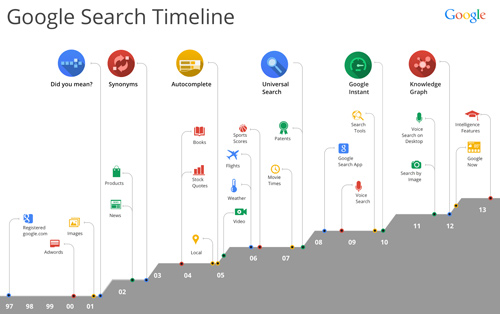|
 Hummingbird Hummingbird
in Boulder, Colorado,
Photo by Jeff Finkelstein |
 |
 |
Hummingbird
Affects 90% of Searches.
Google’s
new Hummingbird update affects 90% of search queries.
The
last time the entire search algorithm was so dramatically
rewritten was in 2001 — only three years after Google
started.
In
2001, most people weren’t texting, because smart phones
weren’t at all common. Maybe you’d see a Blackberry,
but that was about it. Facebook, Twitter, Instagram,
Pinterest weren’t live. Nobody watched videos online,
because YouTube hadn’t been created yet. iPhones and
iPads were science fiction. And most companies had basic
websites, if they had them at all.
But
in 2013, the world is different, and always connected.
Information is always available at your fingertips,
wherever you are.
Google
upgraded, too. The past updates of Penguin,
Panda and Caffeine were incremental.
Hummingbird
Is A Complete Overhaul of Google.
Hummingbird is an overhaul, and governs the
more than 200 elements that make up Google’s search
algorithm.
Danny
Sullivan of Search Engine Land compares the Hummingbird
update to a complete replacement of a car engine. In
the past, Google changed out the equivalent of parts
here and there in the engine, but the Hummingbird update
is like dropping a whole new engine into a car.
|
 Hummingbird Hummingbird
on a Branch in Boulder, Colorado,
Photo by Jeff Finkelstein |
 |
 |
According
to Google, the name Hummingbird stems from the metaphor
of being precise and fast. If you’ve ever seen
a hummingbird hover, this is very true. (To capture
a hummingbird’s wings, you need to use a 1/2,000 of
a second shutter speed. Most iPhone photos are about
1/20 of a second.)
Better
Understanding of End User’s Intent When Searching.
Hummingbird
is not a new way that Google is indexing and ranking
pages to display search results. Instead, Hummingbird
attempts to better understand the end user’s intent
when they are searching.
Why?
People are now using longer "conversational"
type of queries.
I
think that this may be partly because of the success
of Apple’s Siri, which allows you to ask questions
naturally. Instead of asking for a list of restaurants
around your location, you can simply tell Siri that
you’re hungry, and Siri figures out the rest.
According
to Sullivan, an example might be a search query like,
"What’s the closest place to buy the iPhone
5s to my home?"
Before
the Hummingbird update, Google picked out the keywords,
"buy" and "iPhone"
and tried to find a page that matched.
Now,
according to Search Engine World’s Danny Sullivan, Hummingbird
should better focus on the meaning behind the words.
Google
can personalize the search results based on where you
are searching from. For example, Google knows where
you are based on your IP address, or if you’ve used
Google Maps for directions, and registered your home
address.
Google’s
Hummingbird update may figure out that when you write
"place" in a query, in a specific
part of the search, it signals that you want
to go to a physical store to buy the iPhone,
instead of ordering it online.
According
to Google, here are other searches that have been affected:
- Searching
for "acid reflux prescription"
in
the past listed a lot of the acid reflux medications
on the market, and how to purchase them. Now, Google
says their results have been updated to give more
information about how to treat acid reflux in general.
- In
the past, searching for "pay your bills through
citizens bank and trust bank"
led you to the home page for Citizens Bank’s website.
Now, Google’s Hummingbird update will bring you to
the specific page about paying bills online.
What
Does Hummingbird Mean for SEO?
It means now, more than ever, having original,
high-quality content on your site is key. Engaging with
the customer is what moves the SEO dial.
If
you haven’t lost significant traffic, you should be
fine. Hummingbird has now been live for more than two
months.
If
you’re not sure what it means to have engaging content
on your site, that’s the focus of my next few newsletters.
Is
SEO Dead With Hummingbird?
No. But SEO firms that are stuck in the past
with trying to stuff keywords into pages, create meaningless
inbound links, and trying to "trick" Google
into giving higher rankings won’t do well.
A
top ranking can translate into a lot of business for
a company. Google knows this, and understands that this
is a reason why people try to abuse the system.
Google
has a lot of smart people working for them. Writing
content with a white font on a white background hasn’t
worked since the late 90s, and will get you banned today.
How
Has Google Changed Over Time?
Google
keeps changing and upgrading its search algorithm, in
order to stay relevant and give end users the best results
possible.
Customer
Paradigm’s search marketing team spends 25% of their
time devoted to research and testing. What
this means is that two hours of each eight hour work
day are spent keeping up-to-speed on what’s changing
in the search marketing world, and testing out assumptions.
For
example, we might do additional split testing for a
client we’re working on, and apply this learning to
other projects as well.
Here’s
a quick peek at how Google has changed over time:
View
Larger Image >>
- 1997
– Google.com registered
2001 – Did You Mean: Google
search results page asks if you meant to search for
something else
2001 – Google images search launches
2002 – Google News launches
2002 – Synonyms – Google recognizes
that you are searching for a word similar to another
one in meaning.
2004 – Stock quotes, Books
2005 – Auto complete launches
2006 – Weather, Flights and Sports Scores
2007 – Universal Search – gave users
a search results page that combined Web pages, images,
video and other information.
2009 – Google Voice search
2010 – Google Instant – Huge infrastructure
upgrade that returns results almost as soon as someone
types in the search query.
2011 – Search by image. Allows you
to upload an image and search for sites that use that
same or similar image.
2012 – Knowledge Graph. Allows you
to ask specific questions, such as "Who was the
4th President of the United States," and have
Google display the answer, instead of listing sites
that might contain that answer.
2013 – Google Hummingbird update
– recognizes natural conversational search.
|